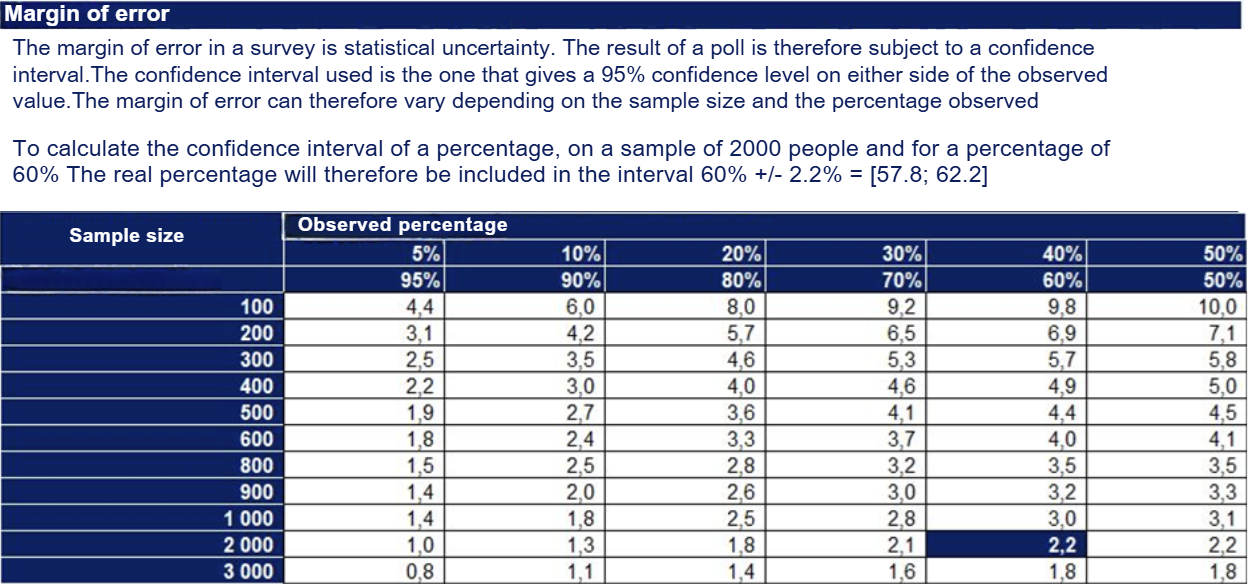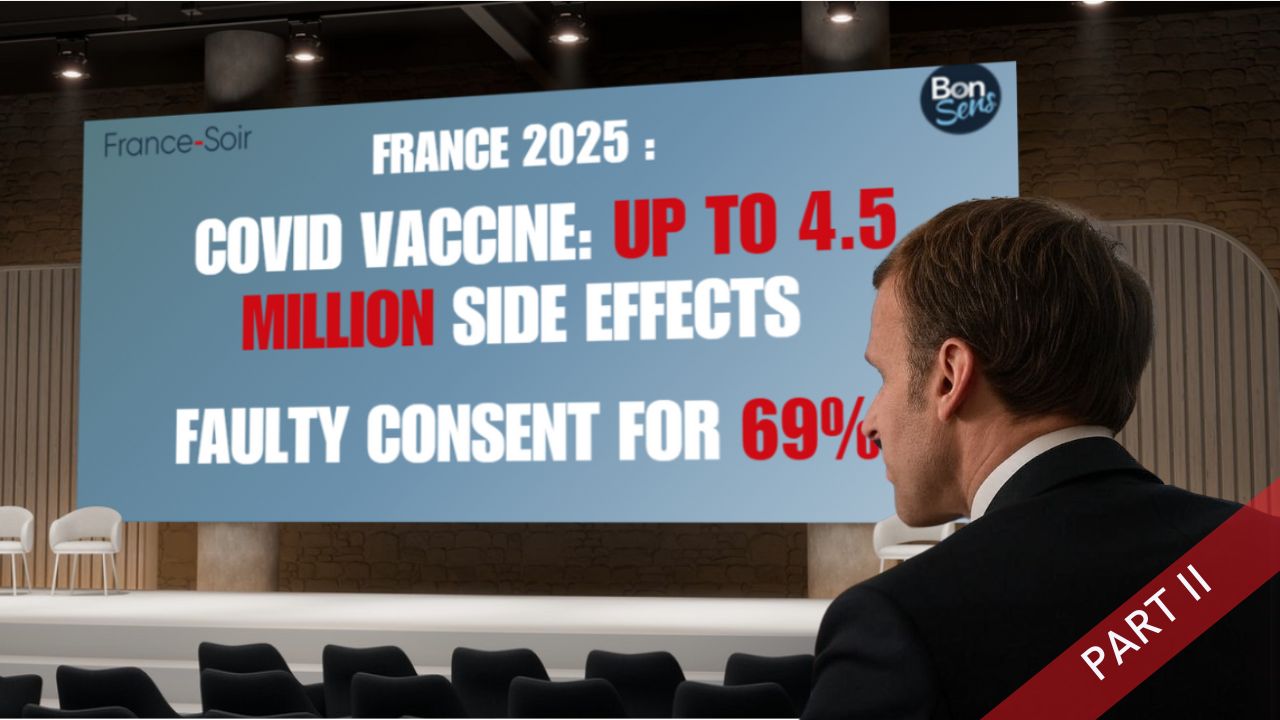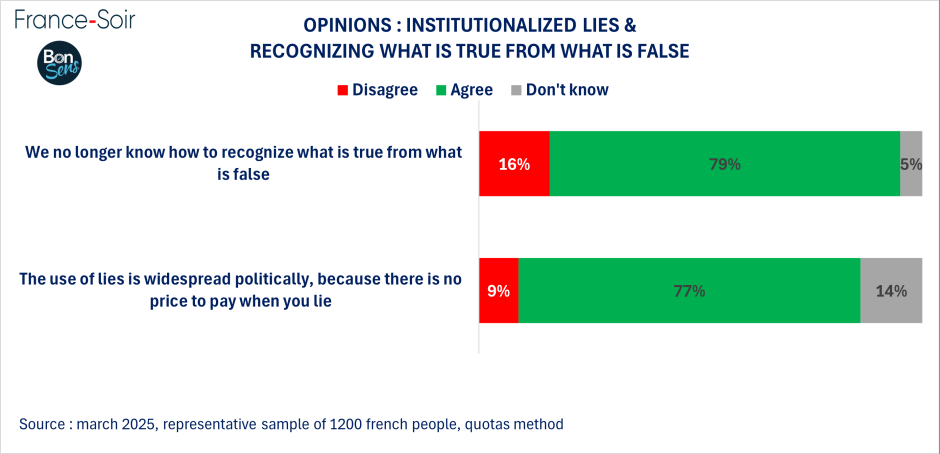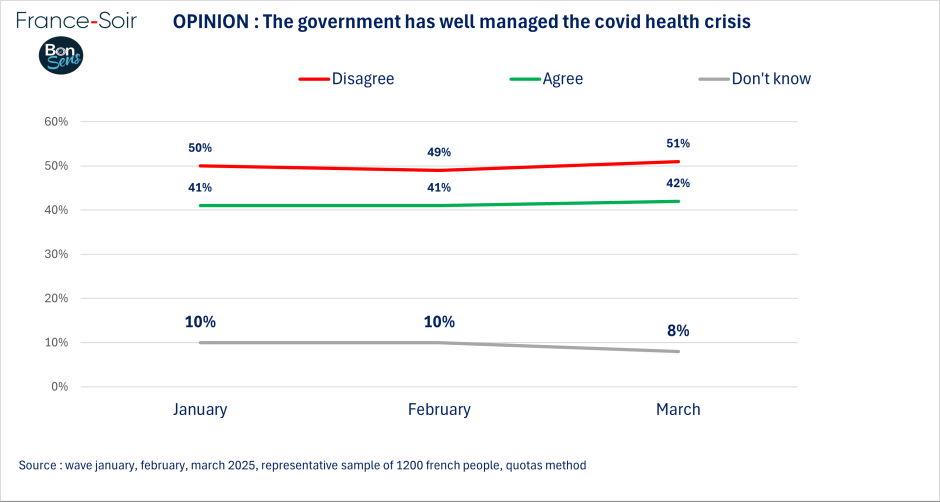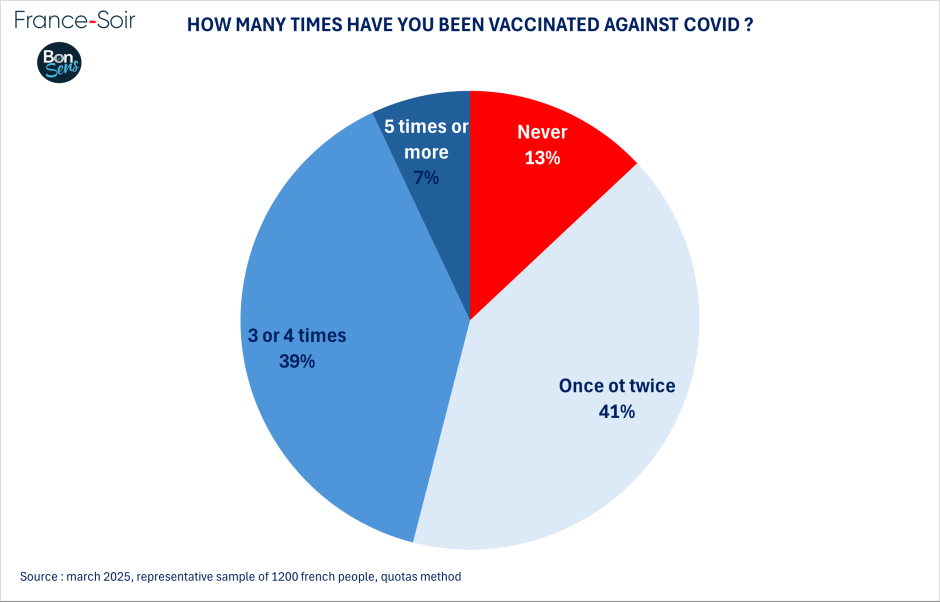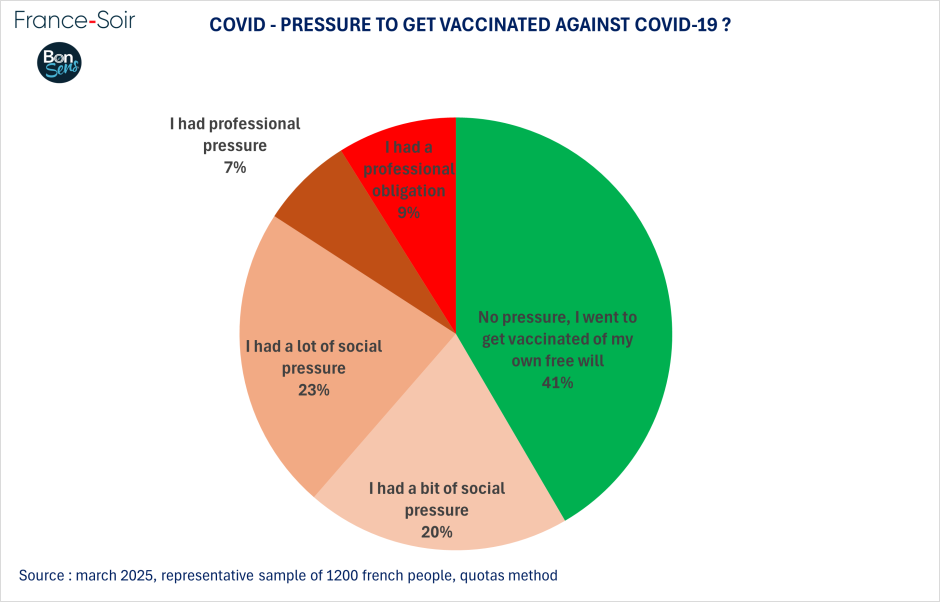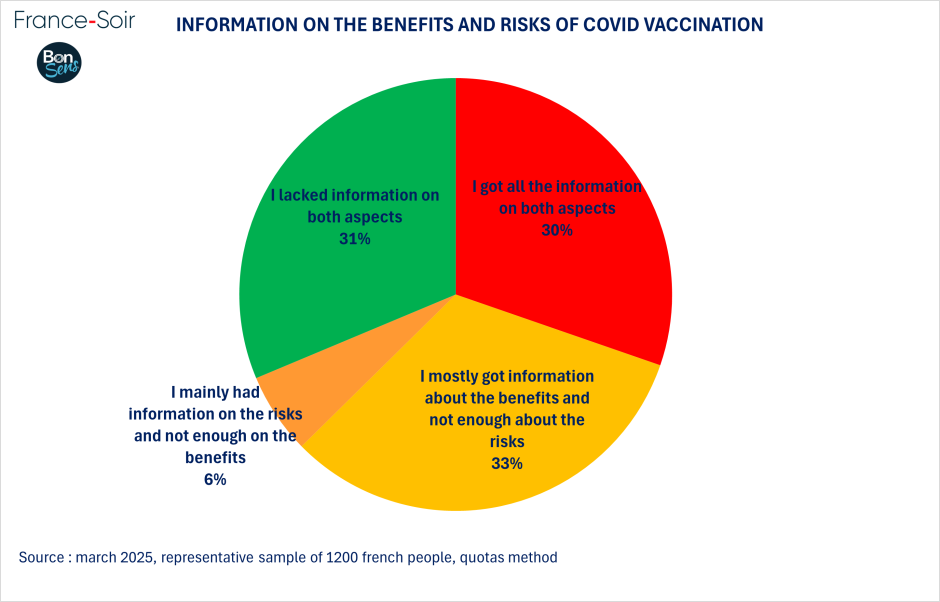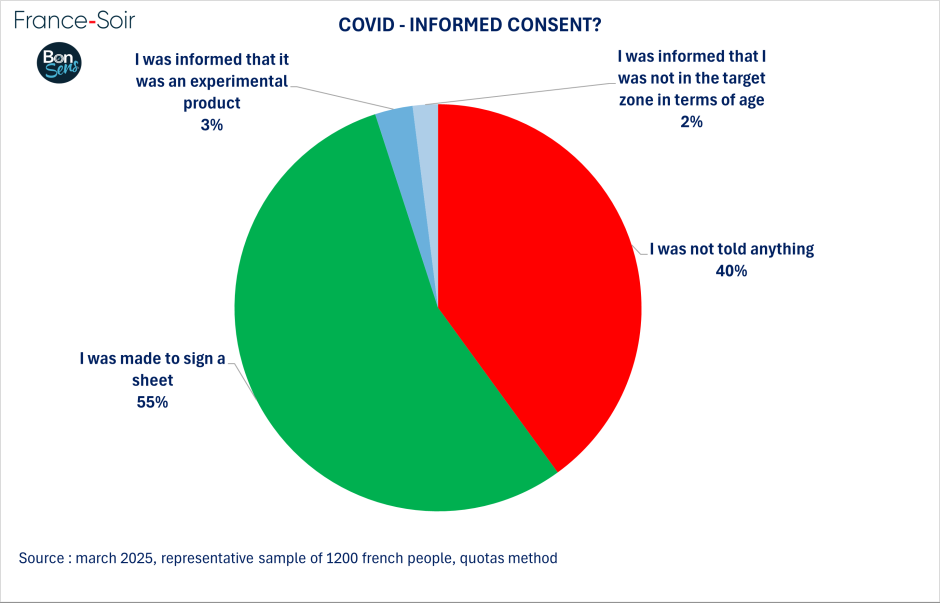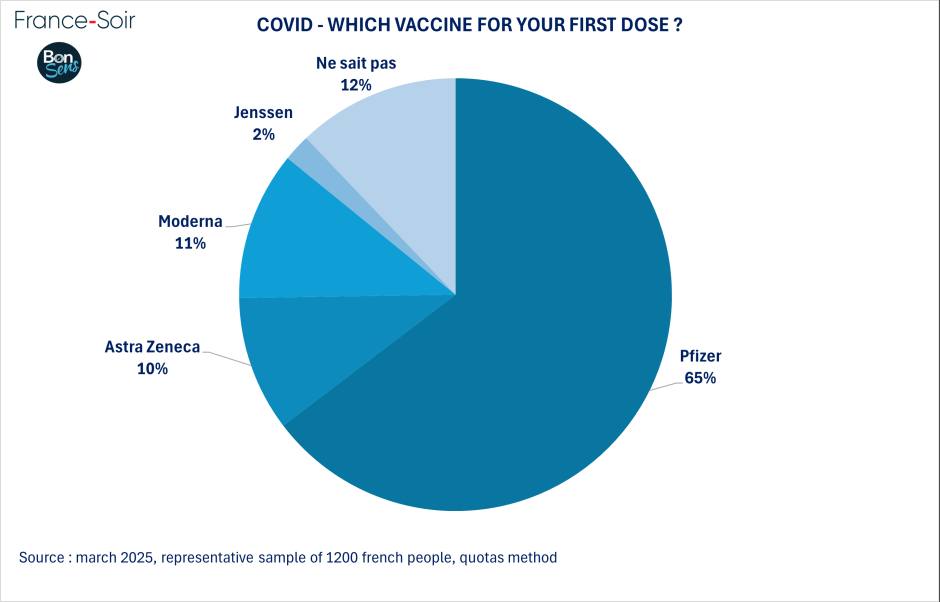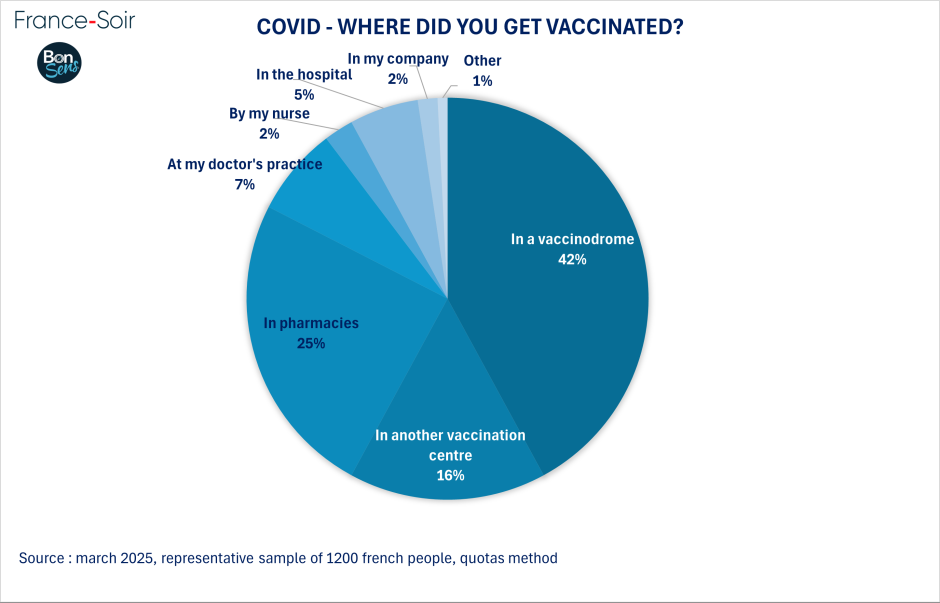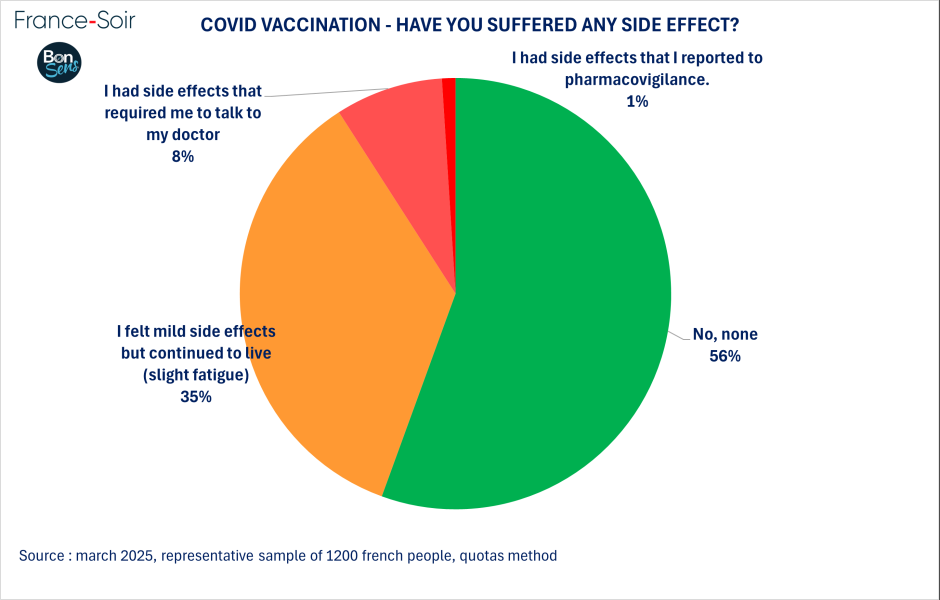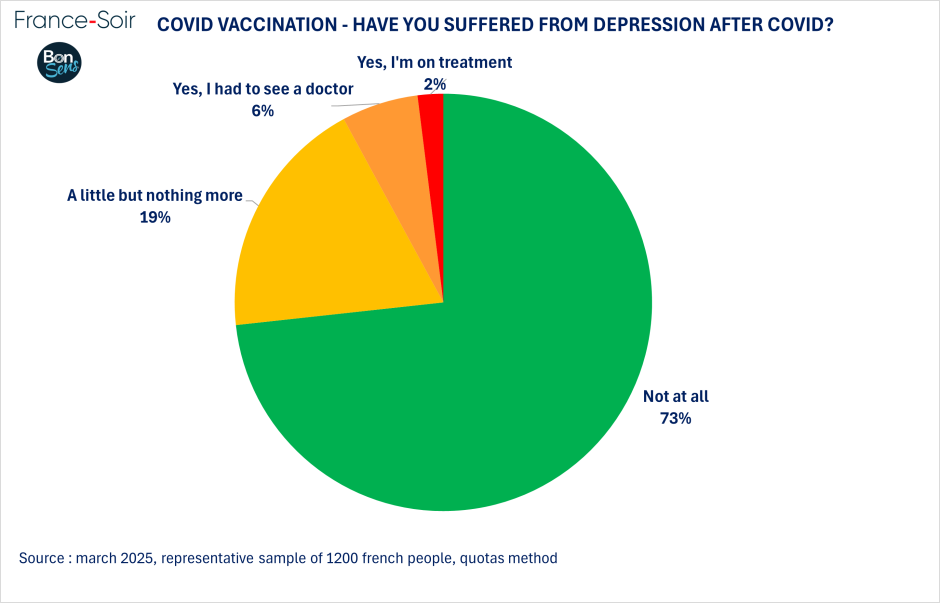BonSens.org & France-Soir
France - Covid vaccination: up to 4.5 million side effects according to a representative survey - part II
SummaryThe third wave of the France-Soir/BonSens.org survey, conducted on March 27 and 28, 2025 among 1200 French people, reveals a persistent mistrust of the government and health authorities. A majority (51%) consider the management of the Covid-19 crisis to be badly handled by the government, 64% call for a commission of inquiry and 79% demand the lifting of defence secrecy on the decisions taken during the covid crisis.
On vaccination, only 13% of French people have never been vaccinated, but 93% stopped before the 5th dose, a sign of a massive disengagement. While 56% say they have had no side effects, 9% report significant adverse effects, i.e. about 4.51 million people out of 50,063 million vaccinated people aged 18 and over (Santé publique France and Covid Tracker).
In addition, it can be estimated that 69% of their consent was not fully informed due to a lack of balanced information on the risks and benefits. These figures, which are based on the declarative due to the lack of official data, underline a crisis of confidence and an urgent need for transparency.
Introduction
In the current climate of mistrust, amplified by successive crises – economic, health and geopolitical – France-Soir and the non-profit BonSens.org have commissioned several waves of sociological surveys from the company MISGroup to probe the perceptions of the French. These studies aim to establish an evidence base on their concerns, opinions and issues deemed critical to the future of the country. This third wave, carried out on March, 27-28th 2025, follows the surveys of January, 16th and February, 26th 2025, which had already revealed a marked loss of confidence in the policies led by Emmanuel Macron. It makes it possible to monitor developments over time and to offer an up-to-date picture of national concerns.
Health and the health crisis: a critical look
Since 2022, Laurent Toubiana, an epidemiologist, and BonSens.org have been calling for data on all-cause mortality by vaccination status and age group, which are essential for objectively assessing the impact of Covid-19 vaccination. Faced with the court's delay in deciding on this request, the opacity persists. In addition, the non-profit ReinfoLiberté and BonSens.org challenged the decision of the Toulouse administrative court to suspend billboards displaying estimates of side effects, even though they were based on data from the ANSM (National Agency for the Safety of Medicines). This censorship fuels a feeling of injustice: 77% of French people believe that "the use of lies is widespread in politics, because there is no price to pay when you lie", and 79% find it difficult to distinguish truth from falsehood in public discourse.
In the absence of official data, this part of the survey relies on the statements of the French to shed light on the real effects of vaccination, in the absence of transparency from the authorities.
Methodology
The results are published in several parts. The first, published this morning, deals with the situation in France, international issues – in particular the Russian-Ukrainian conflict – and national defence issues, in the light of recent government statements. This second part, presented here, focuses on public health issues, the health crisis and vaccination against covid-19. Given the lack of evidence data from the authorities, only the declaration of the French remains to understand the real side effects of vaccination.
In the other parts, the fears of the French, their opinions on democracy and governance will be addressed, and finally a final part will summarize the majority positions of the French in terms of opinion and attitudes.
Poor management of the covid-19 crisis
For 51% of French people, the government has mismanaged the health crisis, a stable observation since January 2025.
This mistrust is reflected in clear demands: 64% want a parliamentary commission of inquiry, and 79% demand the lifting of defence secrecy on the management of the crisis ( Source In addition, 69% call for an independent evaluation of early treatments for COVID-19, reflecting skepticism about the choices of health authorities.
Faced with the opacity of the authorities in providing tangible evidence, only the declaration of the French remains as a factual element that allows us to bring figures to the debate. A little feedback on vaccination, consent and side effects
Vaccination against covid-19: between coercion and disillusionment
13% of French people say they have never been vaccinated. This figure is six points higher than the estimates of French health agencies such as DRESS, which, in August 2022, estimated this figure at 6.5% of the population aged 18 and over.
Initially, trust in health authorities and media campaigns promising universal protection ("all vaccinated, all protected") pushed a majority to get vaccinated. However, only 7% have received 5 or more doses: after the first dose and booster, 93% stopped following the recommendations, a sign of a gradual awareness of the limits or risks.
On coercion, 41% say they have not been pressured at all, while 43% report social pressure (weak or strong), often amplified by media messages. Social pressure therefore does not take into account the real data of science, but would have led to this conformism.
In addition, 9% were forced by their employer, and 7% felt professional pressure, i.e. 59% having been influenced socially or professionally. But on what scientific basis were these obligations imposed? The principle of free and informed consent, a pillar of fundamental rights, seems to be undermined by regulatory agencies or institutions that have ignored ensuring compliance with these international conventions, despite the patient's interest.
A violated or vitiated consent?
Only 31% of respondents believe that they have received all the information on the risks and benefits before vaccination. Conversely, 30% deplore a total lack of information, and 33% note an imbalance favoring benefits over risks.
During vaccination, 40% say they received no explanation, 55% signed a form without details and only 3% were informed of the experimental nature of the vaccines. These figures raise questions about the role of the authorities (ANSM, HAS, ARCOM) in guaranteeing transparent information.
Overall, for 69%, consent was not fully respected in one way or another, since only 31% said they had all the information.
Vaccination modalities - Pfizer pockets the stake
Pfizer dominates the market: 65% of French people have received this vaccine for their first or second dose.
Vaccination sites reflect a mass logic: 42% went through a vaccinodrome or a vaccination centre, where the time for information was reduced, and 25% through a pharmacy, often without prior medical consultation. Another attack on the vice of free and informed consent.
Side effects are much more significant than estimated by health agencies
As for side effects, 56% report none. However, 35% experienced fatigue, and 9% reported more serious effects, reported to their doctor or pharmacovigilance.
Out of 54,672 million vaccinated, including 50,063 million aged 18 and over, this represents 4.51 million people affected (9% * 50,063) – a figure much higher than past health scandals, such as that of contaminated blood.
More worryingly, 1% (i.e. 500,630 people) reported effects for which a report was made to pharmacovigilance, a volume that should have prompted the ANSM to reassess the vaccination campaign.
It should be remembered that the ANSM in its last published report on side effects had reported 200,000 adverse effects recorded, 25% of which were serious, i.e. 50,000 (SAEs). In scientific journals, it is commonly accepted that SAEs are under-reported by a factor of 10 due to the complexity of reporting. This is what we find here with 50,000 SAEs in the ANSM database and 500,630 estimated by the declaration of this survey.
Finally, 8% consulted for post-vaccination depressive disorders, a phenomenon that may explain the increase in the use of neuroleptics.
Perceptions and opinions
The opinions of the French on the following elements characterize their positions on covid:
- 71% think that the lockdown and vaccination have led to doubts and depression.
- 61% consider the drop in the birth rate worrying, 72% of which are linked to the uncertainty of the future.39% report that relatives have suffered side effects from the covid vaccination.
- 18% of women report post-vaccination libido disorders, and 12% of men report erectile problems.
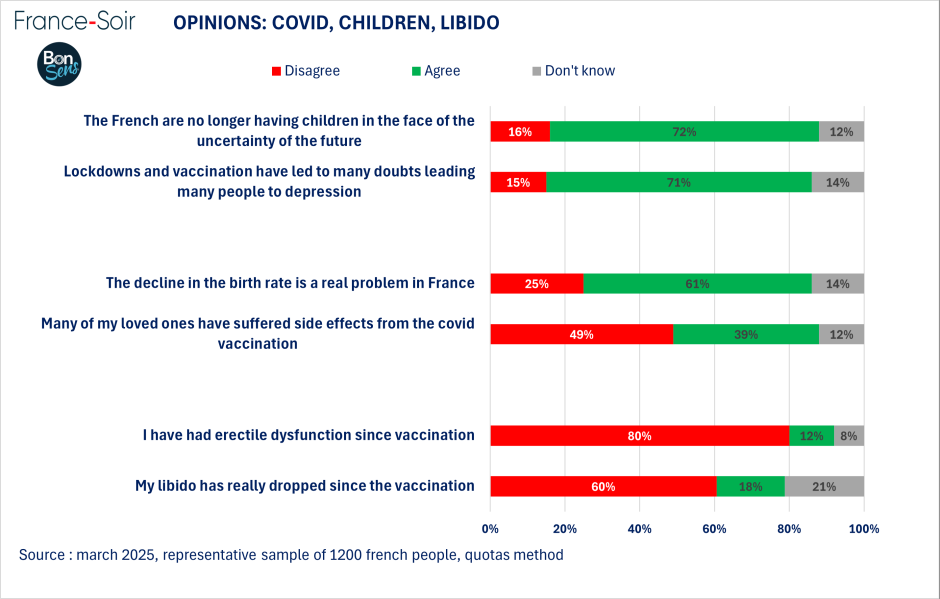
In short, this aspect of the France-Soir/BonSens.org survey highlights many questions about the role of agencies such as the ANSM, the HAS or the ARCOM, which are supposed to guarantee balanced information and protect free and informed consent. In view of such results, these agencies can only be perceived as failing, thus contributing to the loss of confidence of the French in the institutions enshrined in the previous wave is more than normal. We can also question the responsibility of the media, which relayed the messages of the more than optimistic authorities without solid scientific foundation, contributing to social coercion and generalized mistrust. Faced with the opacity of data and the lack of transparent debate, these institutions will have to respond to a growing demand for clarity and accountability.
BonSens.org and France-Soir survey analysed by FranceSoir.fr on the situation in France, conducted on 27-28 March 2025 on a representative sample of the French population of 1200 people. Quota method based on criteria of gender, age, socio-professional category and geographical distribution. The survey was carried out by MIS Group for the Bonsens.org association and the company Shopper Union France SAS, which publishes and publishes the www.francesoir.fr website. Statistically, any poll has margins of error, which in this case are reduced by the size of the sample of 1200 people. Every person has the right to consult the notice provided for in Article 3 of the Act.
